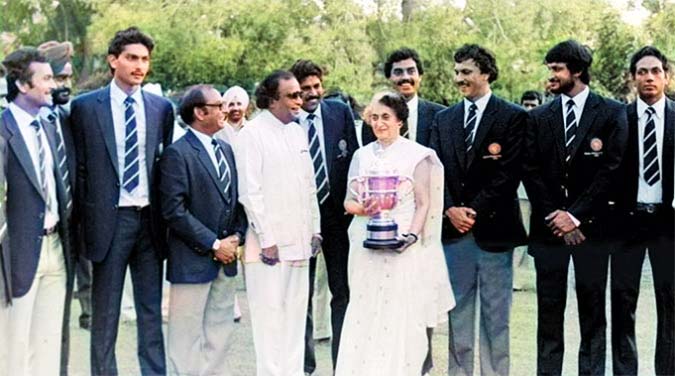Sports
How two World Cup tickets changed cricket’s power bases

Rex Clementine
in Delhi
Literally, nobody expected India to reach the finals of the 1983 World Cup, leave alone winning it. In the previous edition of the tournament – in 1979 – they had even lost a game to Sri Lanka, who were yet to get Test status. But suddenly when Kapil Dev’s team entered the finals, the team had not only reached a new high but a stage was set to change the power bases of cricket too, rather accidentally.
India’s Minister of Education Siddhartha Shankar Ray is on a state visit to the UK. He approaches Indian Cricket Board President N.K.P. Salve, who was also a Cabinet Minister, to ask whether he could get two tickets for the game.
Those days ICC was run by MCC with Lord’s being the headquarters of the sport and MCC President becoming the ICC President automatically.
MCC turns down Salve’s request for two tickets for the final. The Indian board chief finds out that seats at the pavilion reserved for MCC members are empty. Obviously, MCC members aren’t interested in attending a game where England aren’t playing.
Once India create an upset by beating defending champions West Indies in the final, Salve returns home a determined man. He wants to move the next World Cup out of England. But that’s going to be a gigantic task.
Back in India, he calls for a meeting involving other regional heads of cricket such as Gamini Dissanayake and Nuzki Mohammad from Sri Lanka, Air Marshall Noor Khan from Pakistan and so on.
There they agree that the next World Cup should be held in Asia. Salve approaches Indian Prime Minister Indira Gandhi and relates his ambitious plans. He confides that he will struggle to get the finances to host such a mega event.
Mrs. Gandhi, the iron lady, promises him a blank cheque. Salve can go ahead with his plans for the World Cup. So how does she do it? She calls up business tycoon Dhirubhai Ambani, the founder of Reliance Group and father of Mukesh Ambani. The blank cheque is guaranteed.
When the matter is taken to ICC, England are furious and are determined not to let go of the sport’s showpiece event. But Salve had done his homework and played his cards smartly. He had come to a deal with Australia that they would get the chance to host the next World Cup in 1992. Australia agree provided there’s a secret ballot and not an open ballot.
Having brought the World Cup to Asia, Salve’s next move is to make sure there is a fair playing field for all cricketing nations, and he works rigorously to rid founding members of the ICC their veto powers.
This he does by promising member boards equal share of revenues and very soon, England and Australia lose their veto power.
Until very recently, the Indian board worked hand in hand with regional allies. But once they had total power, they wanted to do it solo. What has happened to the Asian solidarity? This is the first World Cup being held in Asia in one country. Always it used to be a joint effort.
Easily, India could have given Sri Lanka half their games to be held in Colombo and let Pakistan and Bangladesh play some of their games in Lahore and Dhaka. You can only wish sanity prevails.
Nobody has complained openly for everyone fears the Indian board. But you can see there are murmurs.
World cricket owes much to N. Salve for breaking England’s clout in the game. A chartered accountant from Nagpur. His parents were both freedom fighters and you can sense from where he got the guts to take on the establishment.
As for Mrs. Gandhi, sadly a year after giving the greenlight for the World Cup to be brought to Asia, she is gunned down by her own security guards. ‘Operation Blue Star’ that she had authorized to take the Sikh militants down, didn’t go down too well with the Sikhs. The military operation was a success, but in the process the forces desecrated the Golden Temple in Amritsar, the Sikhs’ holiest shrine.
As for Sri Lanka, they have been India’s closest ally. Australia once tried to diminish India’s power base by getting former Prime Minister John Howard as the President of the ICC. Howard had agreed to come on board on one condition. That was to get elected uncontested.
India did not object. They just kept quiet. Instead, they used Sri Lanka as a cat’s paw to object to Howard becoming the cricket boss. Sri Lanka’s objections were flimsy. But Maitland Place doesn’t care. All what they want is India to come to Colombo once in two years and play five ODIs and their cricket is set for a few years. And that’s the way the cookie crumbles!